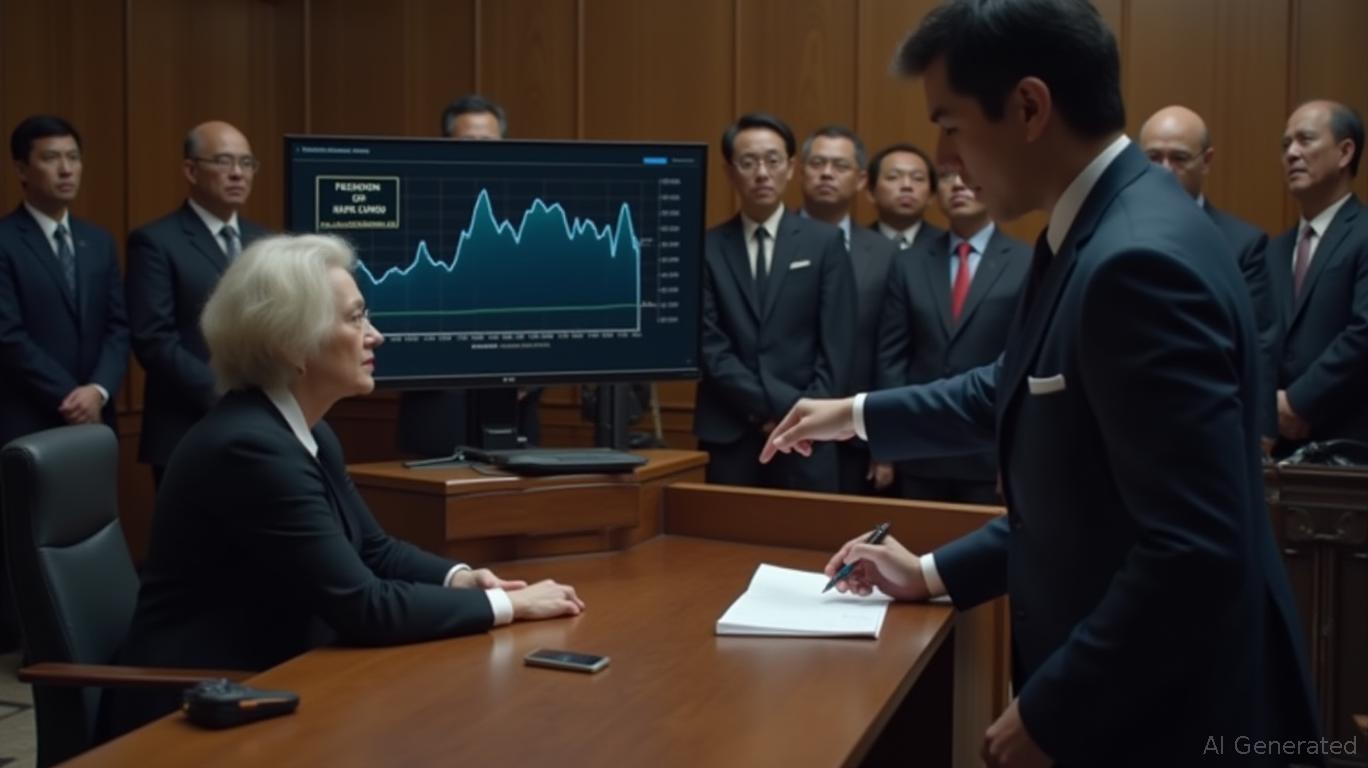U.S. and Singapore Courts Work Together to Freeze Illicit Crypto Assets in Landmark Case
- A U.S. bankruptcy judge extended a freeze on $63M in stolen USDC linked to the 2023 Multichain hack, supporting Singapore's cross-border liquidation efforts. - The order under U.S. Bankruptcy Code Section 1519 aims to preserve assets pending recognition of Singapore's foreign insolvency proceedings in U.S. courts. - Circle's smart contract freeze paused a U.S. class-action lawsuit, highlighting coordinated efforts to recover funds from the $210M hack. - The case tests international judicial collaboration
A bankruptcy judge in New York has prolonged the freeze on wallets containing $63 million in stolen
Issued under Section 1519 of the U.S. Bankruptcy Code, the order is designed to prevent the assets from being transferred or claimed before the court decides if Singapore’s liquidation should be formally acknowledged in the U.S. under Chapter 15, which deals with cross-border insolvency cases. The freeze, enforced through Circle’s USDC smart contract blacklist, maintains the current state of the assets while the court assesses the legitimacy of the foreign proceedings.

The judge’s order also put a hold on a separate class-action lawsuit filed by U.S. investors who are seeking control over the same stolen funds, as both sides agreed to keep the freeze in place during the ongoing legal process. This represents a significant development in the broader mission to recover assets lost in the Multichain collapse, which involved more than $125 million in unusual transfers to unidentified wallets before the protocol was shut down.
The liquidators in Singapore, appointed by KPMG, maintain that the freeze is crucial to prevent "immediate and irreparable harm" if U.S. courts were to lift the restrictions too soon. The case is a test of international judicial cooperation, with the judge emphasizing that provisional relief is an "effective mechanism" to coordinate efforts between U.S. and foreign courts.
Circle originally froze the affected wallets at the request of the U.S. Department of Justice following the hack, but later lifted the seizure order due to the inability to identify those responsible. The company’s adherence to the current freeze highlights its role as the steward of USDC, which is backed by dollar-equivalent reserves held in designated accounts.
Previously known as Anyswap, Multichain linked major blockchains such as Ethereum, Binance Chain, and Polygon, and at its peak in 2022, had a total value locked of $9.2 billion. Its liquidation in Singapore this year was initiated after a petition from Sonic Labs, a partner, to recover the stolen funds.
The resolution of this case could establish new standards for managing cross-border crypto bankruptcies, especially as regulators face the complexities of tracking and retrieving digital assets across different legal systems. With courts in both the U.S. and Singapore now collaborating, the case underscores the increasing global coordination needed to address the distinctive risks posed by decentralized finance platforms.
Disclaimer: The content of this article solely reflects the author's opinion and does not represent the platform in any capacity. This article is not intended to serve as a reference for making investment decisions.
You may also like
Bitcoin Updates: Fed's Interest Rate Reduction Triggers Caution While Bitcoin Teeters on the Edge
- Fed's 25-basis-point rate cut stabilized Bitcoin above $108,000 despite $550M liquidations, with traders adopting defensive positions ahead of policy statements. - Zcash surged 14.8% to $6.22B market cap, surpassing Shiba Inu and Monero, driven by privacy-focused interest and Solana integration plans. - Ethereum's ZKSync Atlas upgrade targets 15,000 TPS and $0 fees, aiming to enhance layer-2 programmability and network efficiency through security audits. - BlockDAG raised $434M in presale with 1,400 TPS
Privacy Takes the Throne: Zcash Overtakes Monero with a $6.2 Billion Market Value
- Zcash (ZEC) surged 16% to $435, hitting an eight-year high with a $6.2B market cap, surpassing Monero and Shiba Inu. - High-profile endorsements from Arthur Hayes and Mert Mumtaz, plus Grayscale's $151.6M Zcash Trust, fueled retail and institutional demand. - Privacy-focused zk-SNARKs and the Orchard protocol drove 30% shielded supply adoption, aligning with global regulatory debates over digital surveillance. - Upcoming November halving and $10,000 price predictions contrast with risks of retracement be
Making AAA Web3 Gaming Accessible to All: Aethir and SACHI Eliminate Hardware Limitations
- Aethir and SACHI integrate GPU cloud tech into SACHI’s Unreal Engine 5 platform, enabling instant, high-fidelity Web3 gaming across devices without hardware constraints. - Leveraging Aethir’s 400,000+ GPU containers, the partnership removes high-end hardware and download barriers, democratizing AAA-quality blockchain gaming access. - The collaboration addresses scalability and security challenges in blockchain gaming, aligning with growing demand for decentralized, cloud-based solutions. - Aethir’s CEO e

Hyperliquid News Today: SEC Decisions Open Doors for Altcoin ETFs, Institutional Demand Rises
- SEC 2025 staking rulings enabled altcoin ETFs like 21Shares' HYPE and Bitwise's BSOL, unlocking institutional crypto access. - BSOL's $55.4M Nasdaq debut with 7% staking yields highlighted Solana's institutional appeal amid $223M AUM. - BNB Chain surpassed TRON in DEX volume (47%) via zero-fee trading, while HYPE's $12.7B cap signaled altcoin diversification. - Ethereum ETFs saw $9.6B Q3 inflows as regulatory clarity and custody solutions drive crypto-mainstream integration.